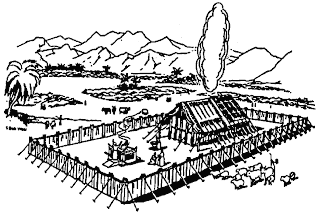
FUNFACT/ QUICKIE: Shemos 38:21 "These are the accountings of the Mishkan, the Mishkan of Testimony, which we counted at the word of Moses; the work of the Levites in the hand of Ithamar, son of Aaron the Kohen"
Why did Moshe Rabbeinu have to do these accountings? Why wasn't he believed by everyone that all of the money that was given to him was going to be used for the Mishkan?
Rav Baruch Simon answers in his sefer Imrei Baruch that Moshe knew that there were going to be scoffers, he therefore felt that if he wanted to be trusted by Klal Yisrael as their leader he had the responsibility to show them where each and everyone of their charitable donations had been allotted within the building of the Mishkan. Moshe felt that it was his responsibility as a role model for generations to come to exemplify the pasuk, (Bamidbar 32:22) "And you shall be clean amongst Hashem and Israel"
The Mishkan (Tabernacle) as we know it, is the place within the camp of Israel in which G-d dwelled (Mishkan = Shachen). This being the case, it was a common practice that many members of Klal Yisrael would come and bring offerings there to the Ribbono Shel Olam. Seemingly however the Mishkan was only effective as G-d's dwelling place only so long as the Luchos (Tablets) were there. Why is that?
The Ohr Hachaim HaKadosh along with many other commentators answers that the Mishkan was only effective as G-d's dwelling place so long as the tablets were there. This was because the Luchos were all encompassing. They featured the commandments that were between man and the divine as well as between man and man.
In order for the Shechina to dwell amongst Klal Yisrael it was/is imperative for both of these ideas to be together. There had to be a firm understanding amongst the people that they did not only have a religious responsibility to the Lord, but that they also had a responsibility to mankind. This is exemplified in the passage, (Bamidbar 32:22) "And you shall be clean amongst Hashem and Israel". When there was no Aron with the tablets inside of it there was no true judge of the Mishkan. If Klal Yisrael did not truly understand the difference between Bein Adam Lichaveiro and Bein Adam Limakom then there was no place for the Shechina to dwell there.
It is said in Meseches Shavuos 30a that it is important that everyone judge their friends virtuously. In addition it says in Meseches Avos (1:6) and in the Torah (Vaykira 19:16) that we must be "Dan Likaf Zechus". Meaning that if we see one of our friends doing something openly that may seem in our minds to be abominable both religiously and personally, it is our responsibility to analyze the situation fully and come to a positive conclusion that places our friend in a meritorious light.
The Mishkan, with the Luchos inside, was symbolic of Klal Yisrael's dedication to valuing their relationship with both G-d and mankind. This can be shown through the pasuk, "And you shall be clean amongst Hashem and Israel" nevertheless even if one person amongst us makes a mistake, the Torah also tells us that we have to be give them the benefit of the doubt and be "Dan LiKaf Zechus".
Many of G-d's commandments regarding the building of the Mishkan seemed meaningless and sometimes strange. Nevertheless after looking deeper and using the two concepts that are learned from Shavuos 30a (it is everyone's responsibilities to judge their friends virtuously) and Avos 1:6 (giving everyone the benefit of the doubt) the Mishkan made a lot more sense.
HAVE A FANTASTIC SHABBOS AND A GUT CHODESH
MiShEnIcHnAs aDaR MaRbIm BiSiMcHa!

No comments:
Post a Comment